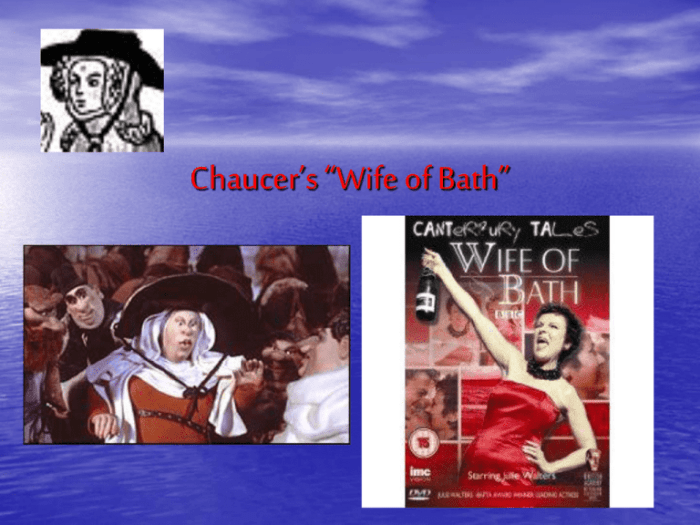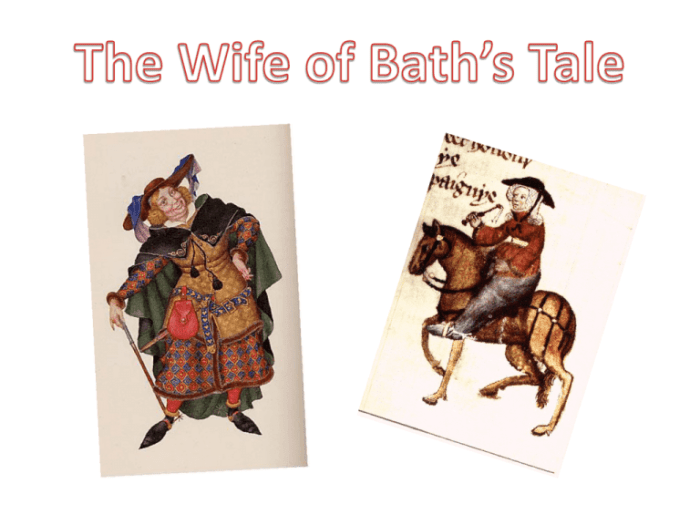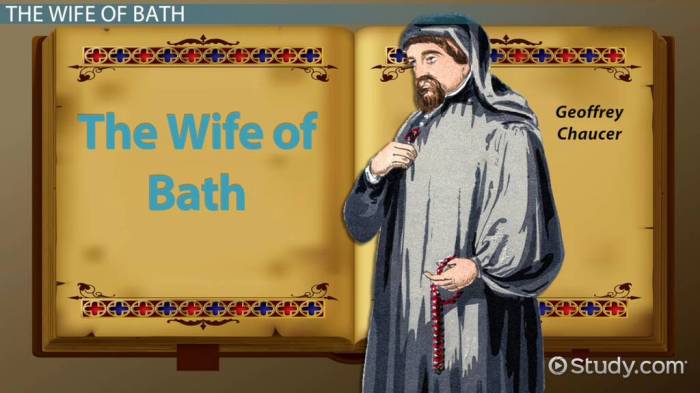Irony in the Wife of Bath’s Tale sets the stage for this enthralling narrative, offering readers a glimpse into a story that is rich in detail and brimming with originality from the outset. As we delve into the tale’s complexities, we uncover a web of ironic elements that serve to illuminate the characters, challenge societal norms, and ultimately reveal profound truths about human nature.
The Wife of Bath, a complex and enigmatic figure, embodies many of the contradictions that define the tale. Through her own words and actions, she exposes the hypocrisies of her time while simultaneously embracing her own flaws. This duality creates a rich tapestry of irony that invites us to question our own assumptions and biases.
Introduction

The Wife of Bath’s Tale is one of the most famous and beloved stories in Geoffrey Chaucer’s The Canterbury Tales. It tells the story of a knight who rapes a young woman and is then forced to marry her. The knight is a cruel and abusive husband, but the woman eventually wins his love and respect.
The tale is full of irony, which is a literary device that uses contrast to create a humorous or thought-provoking effect.
Irony is a figure of speech that occurs when there is a contrast between what is expected and what actually happens. This contrast can be used to create humor, suspense, or drama. In the Wife of Bath’s Tale, irony is used to create a number of different effects.
For example, the knight’s rape of the young woman is ironic because it is the opposite of what we would expect from a knight. Knights are supposed to be protectors of women, not rapists. The knight’s cruelty to his wife is also ironic because it is the opposite of what we would expect from a husband.
Husbands are supposed to love and cherish their wives, not abuse them.
The purpose of this article is to analyze the irony in the Wife of Bath’s Tale. We will examine the different types of irony that are used in the tale and discuss the effects that they create.
Irony in the Wife of Bath’s Tale
Irony is a prevalent literary device employed throughout the Wife of Bath’s Tale, contributing significantly to its overall meaning and message. The tale presents multiple forms of irony, each serving a specific purpose in conveying the author’s intended themes.
Verbal Irony
Verbal irony occurs when a speaker’s words convey the opposite of their intended meaning. In the Wife of Bath’s Tale, this type of irony is evident in the protagonist’s description of her ideal husband:
- “He must be wise, and rich, and old, and gray.”
On the surface, these qualities appear desirable, but the irony lies in the fact that they are traditionally considered unattractive or undesirable in a romantic partner. Through this verbal irony, Chaucer highlights the Wife of Bath’s unconventional views on marriage and challenges societal norms.
The Wife of Bath’s Character
The Wife of Bath, a complex and multifaceted character, presents a tapestry of contradictions that contribute significantly to the irony embedded within her tale. Her bold and assertive nature, coupled with her unconventional views on marriage and female autonomy, challenges societal norms and expectations.
The Wife of Bath’s extensive marital experience, with five previous husbands, has profoundly shaped her perspective on love, relationships, and the role of women in society. Her pragmatic approach to marriage, emphasizing financial stability and sexual fulfillment, subverts the traditional notions of romantic love and domesticity.
Her Personality and Experiences
The Wife of Bath’s personality is characterized by her wit, intelligence, and unwavering self-confidence. She is unafraid to express her opinions and desires, even if they deviate from societal expectations. Her boldness and outspokenness challenge the prevailing patriarchal norms, giving voice to female perspectives that were often marginalized during the medieval period.
Her experiences as a wife and a woman in a male-dominated society have equipped her with a unique understanding of the complexities of human relationships. Her firsthand knowledge of the challenges and inequalities faced by women provides a foundation for her critique of the institution of marriage and the treatment of women in society.
Revealing Her True Nature, Irony in the wife of bath’s tale
The irony in the Wife of Bath’s tale stems from the juxtaposition between her unconventional character and the traditional expectations of women in her time. Her assertive nature, coupled with her critique of marriage and female subordination, exposes the hypocrisy and double standards that govern society’s treatment of women.
By presenting a female character who defies societal norms and embraces her own agency, the Wife of Bath’s tale challenges the patriarchal power structures and invites readers to question the traditional roles assigned to women. Her story serves as a powerful reminder of the resilience and agency of women, even in the face of adversity.
Social and Cultural Context

The Wife of Bath’s Tale was written in the late 14th century, a time of significant social and cultural change in England. The tale reflects the prevailing attitudes and beliefs of the time, including the role of women in society, the nature of marriage, and the importance of social hierarchy.
The tale challenges these attitudes and beliefs by presenting a strong and independent female character who defies the traditional expectations of her time. The Wife of Bath is a wealthy and experienced woman who has been married five times. She is outspoken, assertive, and unafraid to challenge the authority of men.
Role of Women
The Wife of Bath’s Tale challenges the traditional view of women as passive and subservient. The Wife of Bath is a strong and independent woman who is not afraid to speak her mind. She is also a successful businesswoman and a wealthy landowner.
Her tale shows that women are capable of achieving great things if they are given the opportunity.
Nature of Marriage
The Wife of Bath’s Tale also challenges the traditional view of marriage. The Wife of Bath has been married five times, and she has a very different view of marriage than most people of her time. She believes that marriage should be based on mutual respect and love, not on financial gain or social status.
Social Hierarchy
The Wife of Bath’s Tale also challenges the traditional social hierarchy. The Wife of Bath is a wealthy and powerful woman, but she is not a member of the nobility. Her tale shows that people from all walks of life can achieve great things if they are given the opportunity.
Literary Significance: Irony In The Wife Of Bath’s Tale

The Wife of Bath’s Tale holds significant literary importance in the realm of English literature. Its clever use of irony has left an enduring impact on subsequent literary works and contributed to the development of the genre.
One of the tale’s most striking aspects is its use of irony to critique societal norms and expectations. Chaucer employs irony to highlight the hypocrisy and double standards that prevail within the social and cultural context of the time. This satirical approach challenges conventional wisdom and invites readers to question the validity of established beliefs.
Influence on Other Works
The Wife of Bath’s Tale has influenced numerous literary works throughout history. Its innovative use of irony has inspired authors such as Geoffrey Chaucer, William Shakespeare, and Jane Austen. Chaucer’s use of irony in The Canterbury Tales is heavily influenced by the Wife of Bath’s Tale, and Shakespeare’s use of irony in his plays, such as Much Ado About Nothing, can be traced back to Chaucer’s work.
Contribution to English Literature
The Wife of Bath’s Tale has played a pivotal role in the development of English literature. It is considered a masterpiece of Middle English literature and has contributed to the establishment of English as a literary language. The tale’s complex characters, vivid storytelling, and insightful commentary on human nature have made it a timeless classic that continues to be studied and enjoyed by readers today.
Conclusion

In conclusion, irony permeates the Wife of Bath’s Tale, serving as a powerful literary device that enhances its themes and characters. Chaucer’s skillful use of irony allows readers to explore the complexities of human nature, the nature of truth, and the relationship between the sexes.
The tale’s enduring relevance stems from its timeless themes of love, marriage, and power dynamics. Its ironic twists and turns continue to resonate with readers today, reminding us of the complexities of human relationships and the challenges of finding true love and fulfillment.
Key Questions Answered
What is the significance of irony in the Wife of Bath’s Tale?
Irony serves as a powerful tool for social commentary, character development, and literary exploration, allowing Chaucer to critique societal norms, expose human foibles, and reveal the complexities of human nature.
How does the Wife of Bath’s character contribute to the irony of the tale?
The Wife of Bath’s complex and contradictory character embodies many of the contradictions that define the tale. Through her own words and actions, she exposes the hypocrisies of her time while simultaneously embracing her own flaws, creating a rich tapestry of irony.
What is the social and cultural context of the Wife of Bath’s Tale?
The tale reflects the prevailing attitudes and beliefs of the medieval period, particularly regarding gender roles, marriage, and the Church’s authority. Chaucer’s use of irony challenges and reinforces these attitudes, offering a nuanced exploration of societal norms.